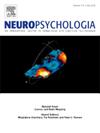成人中重度创伤性脑损伤后情境依赖关系记忆的灵活使用中断
IF 2
3区 心理学
Q3 BEHAVIORAL SCIENCES
引用次数: 0
摘要
学习联想信息并从记忆信息中提取规律以适应目标是导航生活的标志。适应性目标指示行为历来归因于前额叶功能,最近归因于海马体关系记忆。这两个系统中的任何一个在创伤性脑损伤(TBI)中都很常见,它们的中断对日常生活产生深远的影响。在本研究中,我们研究了慢性、中度至重度脑外伤对关系记忆过程的影响,以及利用从记忆信息中提取的规律或规则通过显性反应和眼球追踪来指导行为的能力。有创伤性脑损伤和没有创伤性脑损伤的个体完成了一个情境依赖的关系记忆任务,旨在评估1)重叠关系关联的形成和组织(海马体依赖);2)习得和灵活使用情境依赖规则(腹内侧前额叶依赖)。行为测试显示,相对于神经正常匹配的比较参与者,脑损伤参与者在情境依赖的关系记忆测试上明显受损,但在记忆引导下的规则使用方面表现出保留。眼动追踪数据显示,脑外伤参与者在研究中信息收集基本完好,但在测试中灵活性受损,导致行为结果不佳。至关重要的是,这些数据表明,关系性记忆障碍是脑外伤中行为功能障碍的一个重要来源,这可能导致实验室测试和现实生活中受伤后长期轨迹的不良结果。此外,本研究强调了将眼动追踪纳入脑外伤研究的可行性和优势,以获得跨时间信息收集和使用的新见解。本文章由计算机程序翻译,如有差异,请以英文原文为准。
Disrupted flexible use of context-dependent relational memory in adults following moderate-severe traumatic brain injury
Learning associative information and extracting regularities from that remembered information to adaptively meet goals is a hallmark of navigating life. Adaptive goal-directive behavior has been historically attributed to prefrontal functions, and more recently to hippocampal relational memory. Disruptions in either of these systems, both frequently seen in Traumatic Brain Injury (TBI), have far reaching consequences in everyday life. In the current study, we investigate the impact of chronic, moderate-to-severe TBI on both relational memory processes as well as the ability to use regularities or rules extracted from that remembered information to guide behavior via both overt responses and eye-tracking. Individuals with and without TBI completed a context-dependent relational memory task designed to assess both 1) the formation and organization of overlapping relational associations (hippocampal-dependent); and 2) the acquisition and flexible use of learned, context-dependent rules (ventromedial prefrontal-dependent). Behavioral measures revealed that relative to neurotypical matched comparison participants, participants with TBI were significantly impaired on context-dependent relational memory measures, but showed spared memory guided rule-use. Eye-tracking data indicated largely intact information gathering at study for participants with TBI, but impaired flexibility at test leading to poor behavioral outcomes. Critically, these data suggest that relational memory impairment is a significant source of behavioral dysfunction in TBI, which likely contributes to poor outcomes in both laboratory testing and real-life, long-term trajectories following injury. Furthermore, this study highlights the feasibility and strength of incorporating eye-tracking into studies of TBI to gain novel insights into information gathering and use across time.
求助全文
通过发布文献求助,成功后即可免费获取论文全文。
去求助
来源期刊

Neuropsychologia
医学-行为科学
CiteScore
5.10
自引率
3.80%
发文量
228
审稿时长
4 months
期刊介绍:
Neuropsychologia is an international interdisciplinary journal devoted to experimental and theoretical contributions that advance understanding of human cognition and behavior from a neuroscience perspective. The journal will consider for publication studies that link brain function with cognitive processes, including attention and awareness, action and motor control, executive functions and cognitive control, memory, language, and emotion and social cognition.
 求助内容:
求助内容: 应助结果提醒方式:
应助结果提醒方式:


